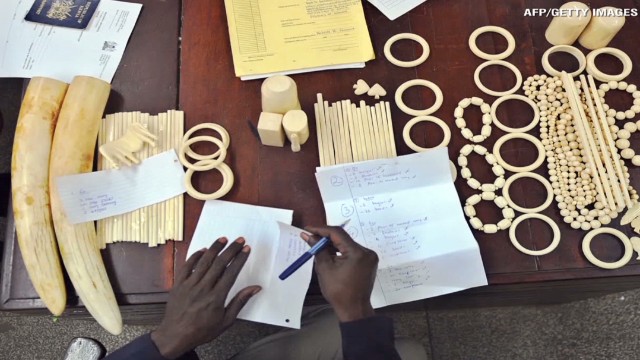Story highlights
- It's the first time the U.S. has offered such a reward, John Kerry says
- In addition to the reward, Colorado wildlife officials destroyed six tons of elephant ivory
- The United States is the second-largest retail market for illegally acquired ivory, after China
- Profits from wildlife trafficking are between $8 billion to $10 billion a year
The message is simple: stop wildlife trafficking.
And to highlight it, the United States destroyed tons of elephant ivory it has seized over the years -- and will pay out $1 million to make sure it doesn't happen again.
Hours before the destruction of the stockpile in Colorado Thursday, Secretary of State John Kerry announced the reward money to help dismantle elephant and rhino trafficking syndicates.
It's the first time the United States has offered such a reward, he said.
Kerry said the bounty will target the Xaysavang Network, a wildlife trafficking syndicate based in Laos, which has affiliates in South Africa, Mozambique, Thailand, Malaysia, Vietnam and China.
"The involvement of sophisticated transnational criminal organizations in wildlife trafficking perpetuates corruption, threatens the rule of law and border security in fragile regions, and destabilizes communities that depend on wildlife for biodiversity and eco-tourism," Kerry said.
Profits from animal trafficking are between $8 billion to $10 billion a year, most of which are used to fund narcotics and human trafficking, according to Kerry.
Commercial ivory trade was banned in the United States in 1989. The crushing of the six-ton stockpile of elephant ivory near Denver is the first time the U.S. has destroyed such large quantities.
The ivory was seized and maintained as evidence until court trials were completed. Once the cases were concluded, some of it was used for training law enforcement officers.
"Over the past 25 years, we have accumulated far more elephant ivory than we can use for these purposes, and decided to destroy this material as a demonstration of our commitment to combating wildlife trafficking," the U.S. Fish and Wildlife Service said.
"We want to send a clear message that the United States will not tolerate ivory trafficking and the toll it is taking on elephant populations, particularly in Africa."
The illegal ivory trade has doubled worldwide since 2007, with the United States the second-largest retail market for illegally acquired ivory. China is the largest market.
Poaching of the rhino horn is also a lucrative industry. Much of the loot is sold to the affluent in Asia, where some believe the horns cure a series of ills, including cancer and hangovers, and can boost virility.
Last year alone, about 745 rhinos were poached throughout Africa -- the highest number in two decades. Some rhinoceros subspecies have been declared extinct.
Conservation groups say the recent surge in the illicit ivory trade has resulted in the killing of 30,000 African elephants annually in recent years.
Other nations including the Philippines, Kenya and Gabon have destroyed large quantities of ivory in recent years.









